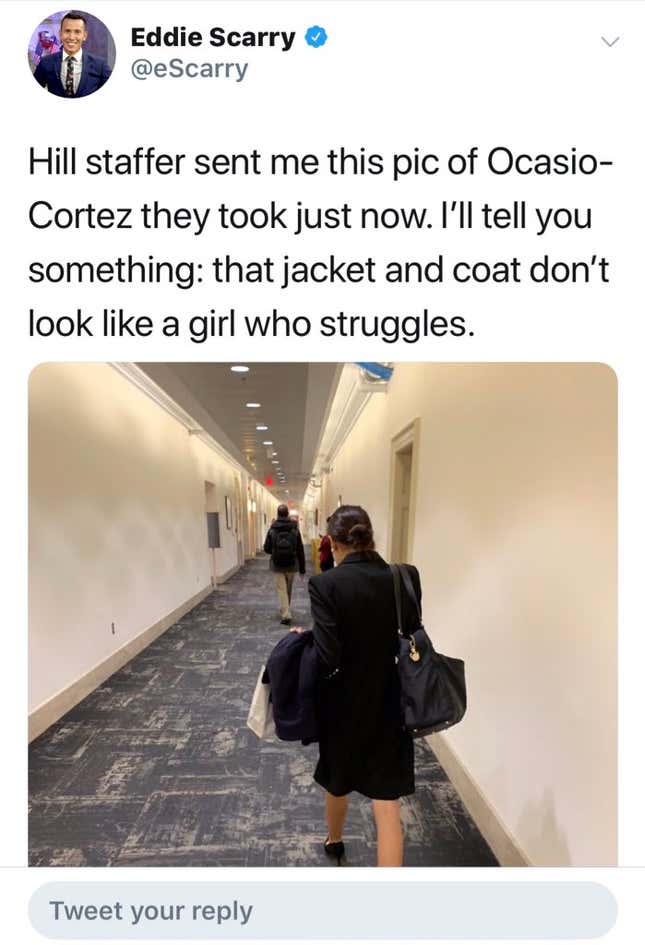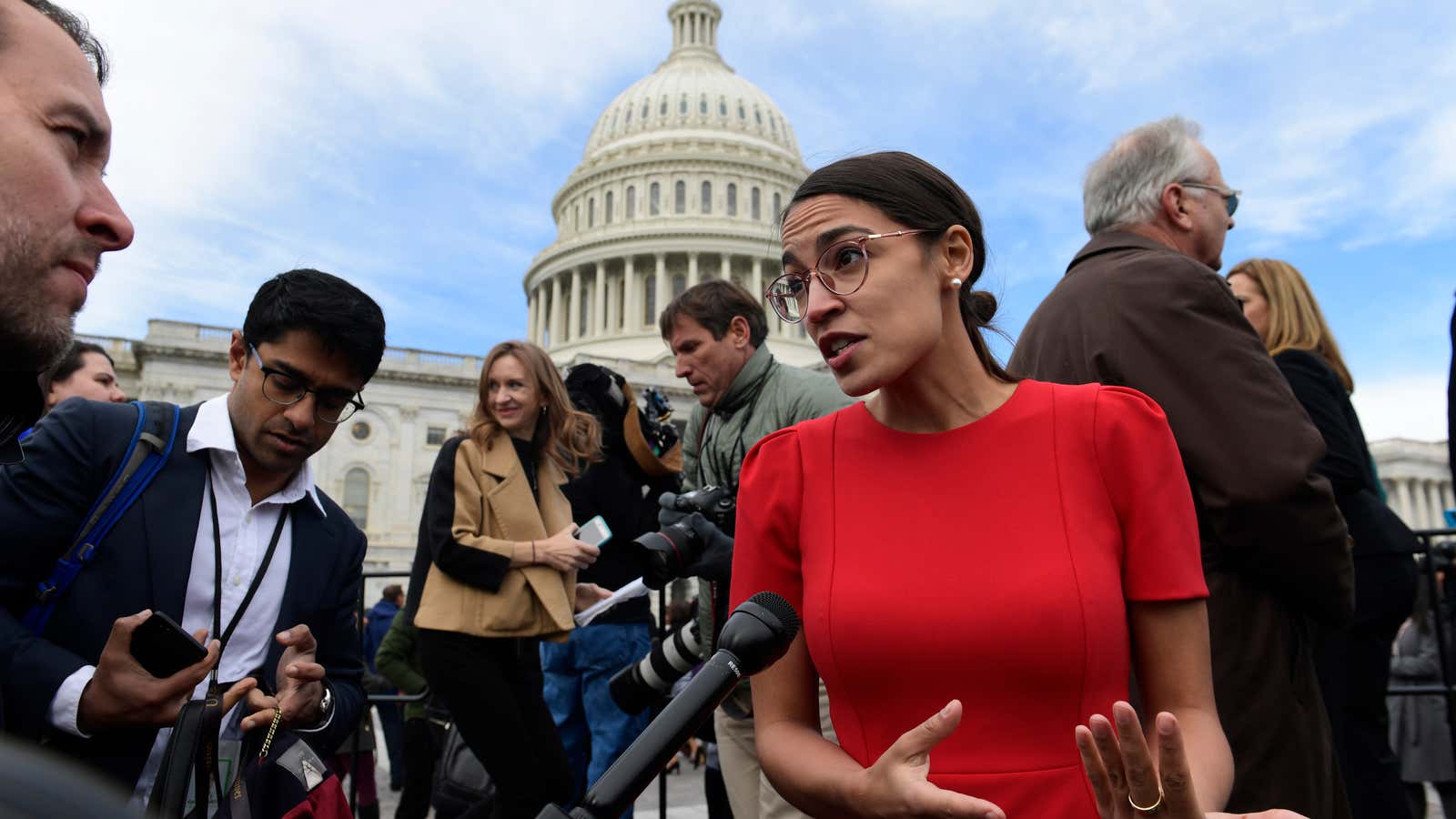First, it was her clothes. Then, her savings account.
What Alexandria Ocasio-Cortez’s critics still don’t understand is that their focus on how she doesn’t meet their expectations only amplifies her power—and deepens her connection to the young, ambitious, working- and middle-class Americans who see her as their representative on the national stage.
Ocasio-Cortez, age 29, is the youngest woman ever elected to Congress. Her 2018 grassroots campaign for New York’s 14th congressional district seat catapulted her into the national spotlight, as her social media fluency and natural chutzpah helped her promote her support for tuition-free college, universal Medicare, gun reform, private-prison reform, affordable housing, and abolishing ICE.
A former Bernie Sanders organizer and educational director at the National Hispanic Institute, Ocasio-Cortez’s rising national star is largely attributable to her ability to relate to a wide swath of Americans who did not see themselves in other political figures. Less than a year ago, Ocasio-Cortez—whose father was a small business owner in the Bronx and mother is a housekeeper—was waiting tables and bartending to make the rent. After her win in November, Ocasio-Cortez said she couldn’t pay for a Washington, DC apartment until her congressional salary begins in January.
Ocasio-Cortez’s refusal to let her current finances define her future potential is precisely what makes her so appealing to so many.
“Wow, I love her so much,” my best friend texted me about Ocasio-Cortez not being able to make that DC rent, a struggle we both deal with at age 25 in New York City. “Me too,” I texted back.
The rent discussion prompted looks at Ocasio-Cortez’s financial disclosure forms (pdf), and at her office’s statement that the incoming congresswoman has less than $7,000 in personal savings. Ocasio-Cortez’s wages in 2017 came to about $26,600—primarily from work at Coffee Shop Tacqueria—and she is still paying off between $15,000 and $50,000 in student-loan debt.
Her savings are markedly less than most members of Congress. Many conservative media outlets and critics have cited this as further evidence that Ocasio-Cortez is not qualified or ready to be a congresswoman.
Mainstream outlets have also indulged this fixation with Ocasio-Cortez’s finances, including CNBC, which ran a story featuring a financial planner who said that “Ideally, a 29-year-old would have at least a few thousand dollars in a cash reserve and the equivalent of a year’s salary in a retirement investment account,” and that “Ocasio-Cortez should have over $27,000 saved for retirement.”
This obsession is unsurprising: Ocasio-Cortez’s finances make her different. Threatened by “different,” and by women, and people of color in power at large, many establishment politicians and media organizations will take every opportunity to extinguish Ocasio-Cortez’s fire. This financial obsession is also grotesque and insulting. As Salon politics writer Amanda Marcotte writes in a smart Twitter thread:
“A lot of this is pandering to the boomer-age viewers, so they can tut-tut about how irresponsible those avocado toast-eating millennials are,” Marcotte continues. “Instead, they should be asking why it’s become so hard for young people to save for the future. (Hint: It’s housing and student loans.)”
Ocasio-Cortez’s $7,000 in savings, similar to her brilliantly relatable Instagram presence, is exactly why she’s becoming a powerful symbol and a role model for young Americans desperate for hope and national political change.
Last week, the internet blew up when Washington Examiner writer Eddie Scarry tweeted a photo of Ocasio-Cortez walking down a hallway in a black suit and carrying her coat, along with the caption: “I’ll tell you something: that jacket and coat don’t look like a girl who struggles.”
Scarry deleted his tweet, but Ocasio-Cortez took a screenshot:

She then fired back to this classist, sexist, and racially charged insult with an eloquent comeback:
As Annabelle Timsit explained for Quartz, Ocasio-Cortez “is in a position that is normally dominated by white, male members of society…Critics feel threatened by what she represents, and so they choose to focus on her clothes to show that she’s not who she says she is—and by extension, that she doesn’t belong.”
Ocasio-Cortez’s power is that she does belong, precisely because she is such an untraditional officeholder (not wealthy, white, and male). American college students and alumni collectively owe an estimated $1.5 trillion in student-loan debt. The skyrocketing cost of rent in every major American city, including DC, and the lack of affordable housing options just compound their financial imprisonment.
The squeeze is even tighter for women, LGBTQ people, immigrants, non-Christian Americans, and people of color who see a rise of sexism, racism, homophobia, anti-semitism, Islamophobia, and nationalism as a frightening feature of public discourse in America. And as the #MeToo movement proves, barriers to entry and power remain formidable for women, especially women of color, in every major industry.
Ocasio-Cortez, like so many millennial Americans, has experienced these problems. Yet she refuses to indulge in a victim narrative. She defines herself as a survivor and as a change-maker. As she wrote on Twitter in response to Scarry, “Dark hates light—that’s why you tune it out.”
That’s why my friends and I were thrilled to hear that Ocasio-Cortez’s savings total mirrors our own:
“Wow, its honestly really refreshing to hear how much Ocasio Cortez has in her bank account,” a 23-year old colleague Slacked me this morning. “I’m almost there.”
“RIGHT,” I replied, “It makes me feel like I can do anything.”
“Anything she does makes me feel that way,” my colleague replied.
That is the definition of a political star worth watching—or fearing.
